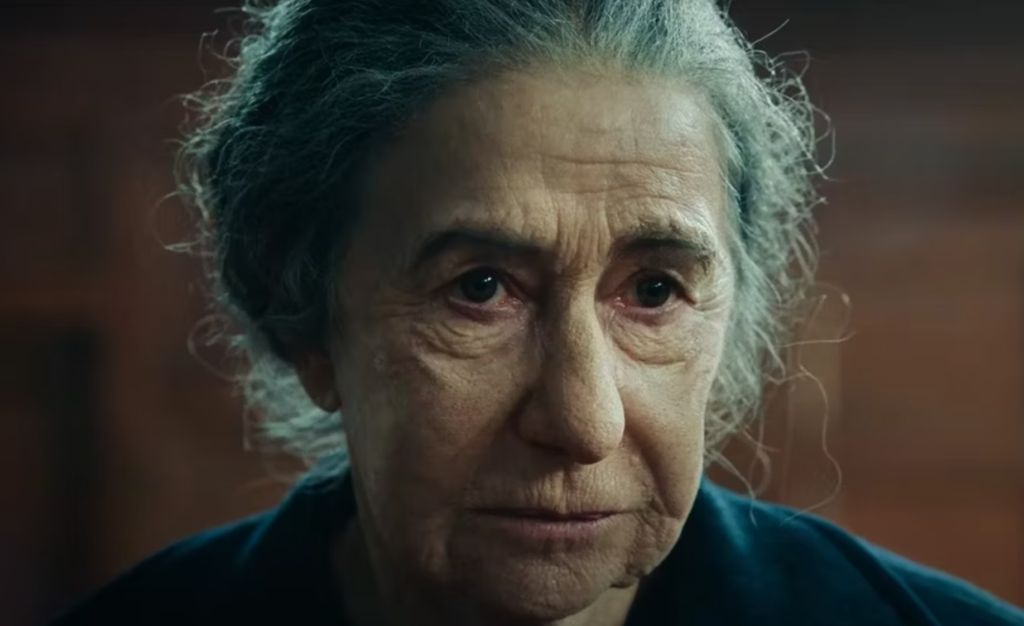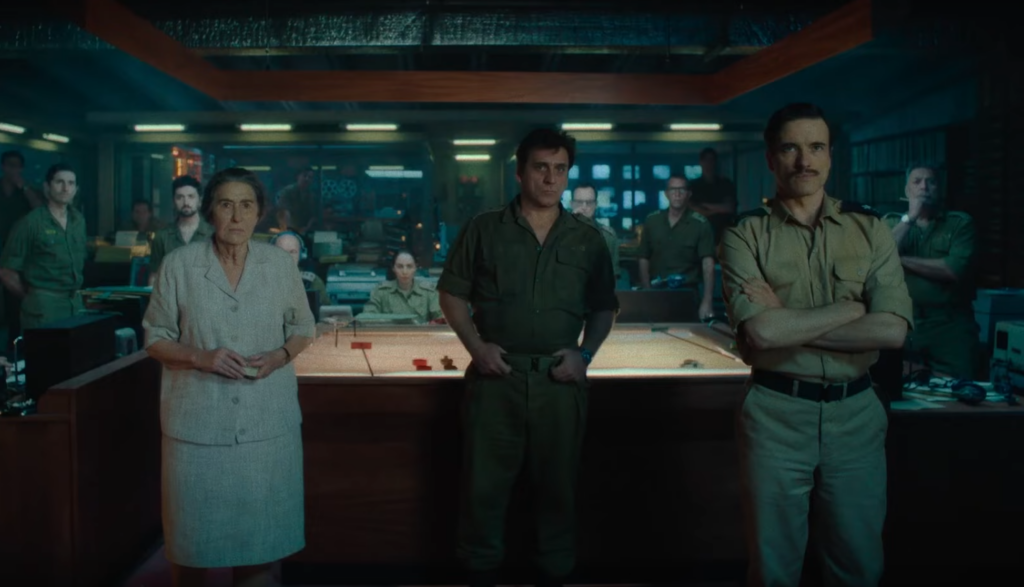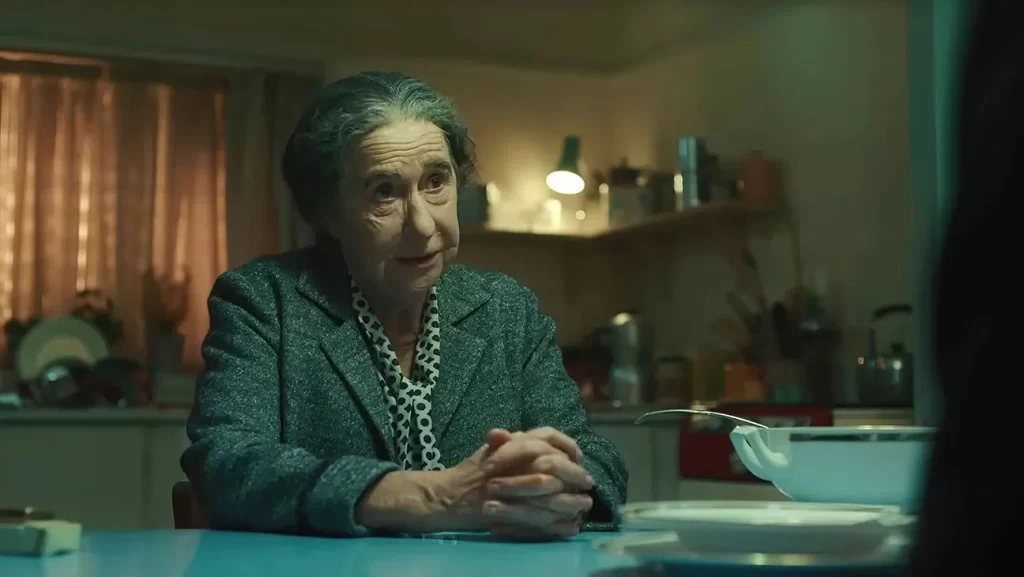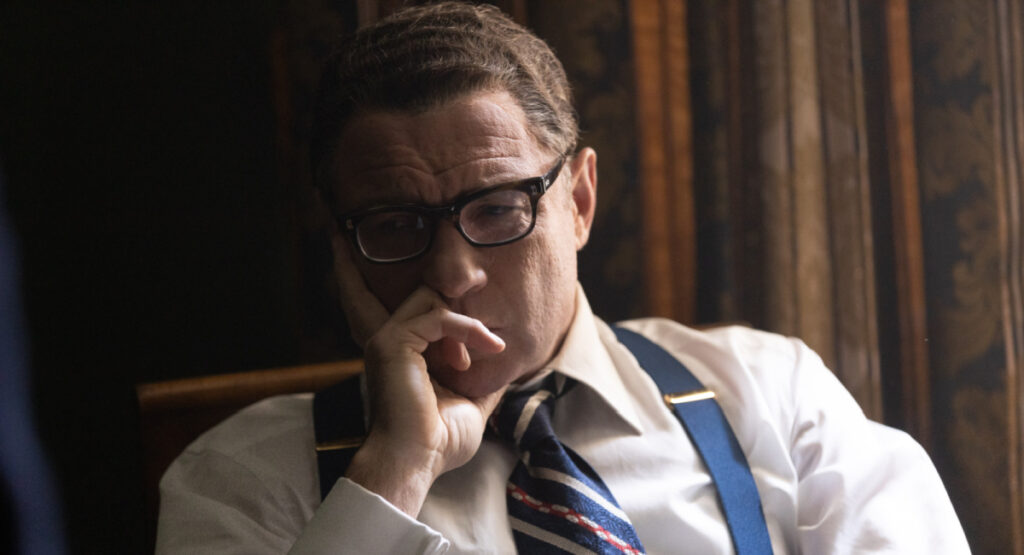
Was Golda Meir a brilliant stateswoman or a power-hungry extremist? A crusader for justice or an enabler of discrimination? You’ve likely already made up your mind on such matters, and even if you haven’t, Golda is unlikely to inform your opinion. Directed by Guy Nattiv from a script by Nicholas Martin, it is a thin and meager picture, providing little insight into its subject beyond a vague intimation of her tenacity. If it defies Truffaut’s maxim that war movies inevitably glorify battle, it does so by virtue of being boring.
Not bloated, though. To its credit, Golda doesn’t try to contemplate the entirety of its heroine’s life; its 100 minutes contain no flashbacks to her childhood or formative sequences depicting her political ascendancy. Instead, the screenplay adopts what might be called the Lincoln approach, attempting to build a sweeping character study by chronicling a single famous event. That would be the Yom Kippur War of 1973, a 20-day conflict in which Israel reeled from a two-pronged attack initiated by Syria and Egypt. The theory of the movie is that, by showing us Meir’s behavior in the face of this catastrophe—her keen intelligence, her dry wit, her steely resolve—it will turn a narrow slice of history into a rich and evocative portrait.
It’s a sensible idea in the abstract. The problem with Golda is that the whole thing feels abstract. It assumes the posture of a leadership picture—the hectic strategy sessions, the sober weighing of human life—but fails to generate any intensity. Mostly it involves people sitting around large tables and hovering in desk-filled offices, listening to radio broadcasts about troop movements and casualties. This isn’t cinema, it’s NPR.

Again, there’s a kernel of intellectual integrity to Golda’s conceit. Nattiv seeks to convey the impotence of military leaders—the helplessness of the men and women (OK, woman) who make seismic decisions but never participate in the actual fighting; all they can do is wait for status reports and damage assessments. But Nattiv, who won an Oscar five years ago for his short film Skin, can’t commit to the removed approach. He constantly splices in lightning-quick inserts of random carnage and archival footage, as though gesturing toward the action epic he wanted to make if he’d possessed a larger budget and a greater imagination. (He only supplies one memorable image—a shot of flames reflected in a commander’s pupils—and its placement feels forced.) Even when his characters are frozen, he can’t sit still.
The result is strange: an ostensibly taut and focused movie that instead feels sloppy and overstretched. The talkiness here should pop with urgency, yet all of the logistical chatter is functional and dull. Dialogue-driven films can be exciting, even in the arena of combat; Oppenheimer proved as much this summer, and the underrated Thirteen Days—a similarly constricted reenactment of colliding foreign powers—infused its clenched meetings in halls of power with energy and suspense. But when Golda’s writing isn’t tedious, it’s insipid. There are snippets of cleverness—when a rumpled Henry Kissinger (Liev Schreiber) insists that he’s an American first, a Secretary of State second, and a Jew third, Meir reminds him that Hebrews read from right to left—but the script largely trades in stale platitudes and pseudo profundities. “Knowing when you’ve lost is easy,” Meir opines at one point. “It’s knowing when you’ve won that’s hard.” Sure.

Meir, of course, is played by Helen Mirren, and you’ll forgive me for burying the lede. The film that Golda most plainly attempts to approximate is Joe Wright’s Darkest Hour, and not just because it mirrors that movie’s trajectory of an embattled premier negotiating with dubious subordinates as they seek to ensure their homeland’s sovereignty. Darkest Hour earned Gary Oldman an Oscar for his hammy portrayal of Winston Churchill, and Golda itself seems to have been engineered as a prestige vehicle for its leading lady; it’s easy to envision the suits at Bleecker Street salivating at the prospect of Mirren picking up her second statuette next March.
I’m skeptical of her chances, but I refuse to belabor the matter any further. (Discussion of awards in any review is ill-advised; for one published in August, it’s unseemly.) As to the merits, I will concede: Mirren is good here. Sure, she and the makeup artists have executed an impressive physical transformation (thanks partly to a prosthetic nose), but she wisely doesn’t overact or unduly embellish her makeover. She instead leans inward, lending Meir a hard-bitten dignity that’s better expressed through pained grimaces and compulsive cigarette-smoking than grandiose speechifying. You want her in your foxhole.
Yet while Mirren delivers a technically astute performance, she can’t rescue a movie that’s simultaneously overwrought and ineffectual. Golda shamelessly tries to manipulate our emotions, whether through scenes of Meir grappling with lymphoma (an underused Camille Cottin plays her loyal assistant) or through the character of a fretful stenographer (Ellie Piercy) who’s meant to symbolize the grief of an entire nation. There is also a pointless framing device in which a quintet of judgmental men hector Meir about her questionable wartime actions. The artificiality of these gestures is amplified by the film’s listless technique and murky palette. Only in a late shot of Meir surrounded by coffins emblazoned with the Star of David does Nattiv synchronize his ambitions with his implementation.

Earlier I mentioned Lincoln, and the definitive movie about the eternal conflict between Israelis and Palestinians remains a different Steven Spielberg picture: Munich, which examined Mossad’s Meir-sanctioned efforts to enact vengeance following the assassinations of the 1972 Olympics. It is hardly fair to expect Nattiv to operate on Spielberg’s level, and in fact the cathartic thrills of that modern classic are antithetical to Golda’s grubby, small-scale style. But while its lack of excitement is understandable, it fails to compensate with sufficient intrigue or intimacy. It is too cautious, too detached, to be interesting.
That feebleness ultimately marks Golda as a betrayal of its title figure. Golda Meir may or may not have been a heroic leader, but it’s undeniable that she made an impact on the world. Nearly half a century removed from her death, we still remember her. Yet Golda is destined to be forgotten.
Grade: C
Jeremy Beck is the editor-in-chief of MovieManifesto. He watches more movies and television than he probably should.
